by Jenny Rose | Oct 29, 2022 | Emotional Intelligence, Feelings, Love
Except I’m not. Balancing, I mean.
A few weeks ago I came across a quote: “Grief is just love with nowhere to go.” Backtracking through multiple sources, I ran it down to a woman named Jamie Anderson who wrote it in her blog, which is now gone. The quote went viral.

Photo by Joshua Earle on Unsplash
It hit me right in the heart.
I’ve written previously about my struggle with intense love that is not received. I don’t mean unrequited romantic love. I mean flesh-and-bone love, blood love, the helpless love and connection we feel for family.
My strategy all my life has been to divert the love I feel but can’t give to the intended recipient (at least not in a way I feel they receive and believe in it or even want it) to others who do need and want it. This practice relieves some of the pressure in my heart, but there are several ways it can go badly wrong. Plenty of people in the world will suck up all the love, attention, and support we give them, but have no thought, or perhaps no ability, of returning it. In this case, my painful, overfull heart becomes withered and empty and I have to detach the vampire I’ve attracted.
I’m not looking for a place to dispose of my love like it’s a worn-out sock. I’m looking for a place where it does some good. Because that’s at the heart of feeling love one can’t give – the futility of it. What’s the point of love if we have no place to give it, if love has nowhere to go?
There are places where I feel my love has been useful. Animals. Children. Hospice work. Emergency rescue work. But, aside from animals and my own children, none of these are intimate relationships sustaining me day-to-day. Animals, sadly, have shorter lifespans than we do. Children, inevitably, grow up and find their own lives, which may or may not include us.
I’ve been thinking about this quote for several weeks, intending to blog about it at some point, but always turning away from it into other subjects. It hurts to think about it. I know intellectually writing about pain helps, but loyalty to those who refuse my love stops me. Or maybe shame? Or maybe guilt? (If a family member won’t accept our love, surely the logical conclusion is we’re a terrible person?) Also, I don’t want to hurt anyone’s feelings, or be unfair, or humiliate another person.
I can always find something to write about. I’ve been posting weekly for six years. But there’s much I do not write about. Too painful. Too intimate. Too risky. Too messy.
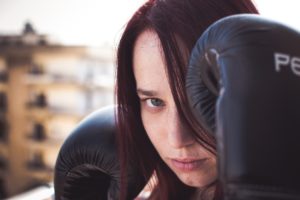
Photo by Jason Blackeye on Unsplash
Sometimes life is like a boxing match. I have good stamina, and I’m dogged as hell. I’m organized and efficient. I try to think clearly about my choices. I’m thoughtful. But every now and then life knocks me down. Hard.
Usually I cope with vigorous exercise, writing, getting a good night’s sleep, and processing with a friend. I get back on my feet and keep going.
But every few years the blows keep coming, hard and fast, unexpected hooks and jabs.
This has been one of those times. I’m nursing my third upper respiratory infection in four weeks. Not COVID, but one of the many other plagues circulating this fall. I’ve once again pulled out the essential oil, the powdered vitamin C, the elderberry and echinacea tea, the nasal spray, the cough and cold medicine. I don’t usually take medication of any kind, but on this third round I feel so bruised and battered I’m choosing to. I’m tired out.
In between this virus, which arrived Thursday night, and the last one, which departed Monday, we discovered our dirt-floored cellar was ankle deep in water due to several inches of recent rain which caused some flooding. It’s going to take more than a thousand dollars to fix it.
Then, yesterday (Can it only be yesterday? It feels like weeks.) I was informed about the illness and injury of a family member, one of those people I love most in the world who is unable to receive it and has amputated me from their life. Now, a long way away from me as I sit here in Maine with a Kleenex box, another family member (another of my dearly loved ones) is carrying the whole situation on their shoulders: the hospital, surgery, legalities, finances, paperwork. My presence would only exacerbate the situation and make everything worse. I know it. The family member managing the crisis knows it.
So here I sit, wretched, broke, sick, and I can do nothing – nothing. A lifetime of petrified love weighs like a stone in my chest. It has nowhere to go. It never has. It’s not useful. It’s not wanted. But I can’t stop feeling it. It’s part of me.
And I’m down for the count. I’m all the way down and nothing in me is ready to get back up. My eyes are swollen. I can’t stop crying. I don’t know where the cold begins and the grief ends. All this grief, a lifetime of grief. It feels endless, bottomless. I don’t think there are enough tears in the world to wash it away. I can do nothing but wait for news and try to be a long-distance support to the one who will accept my support. I can’t seem to get and stay well. I can’t fix the cellar. A plumber in hip boots with a new sump pump will do that early next week.
How can the truest, deepest love we feel be refused and rejected?
Rhetorical question. I don’t expect an answer. I’m sure I’m not the only one who has ever asked that question. Some things just can’t be understood. They’re not fair. They’re not explicable. They’re just life. I learned some time ago to cease arguing with what is.
And what is, right now, is grief. I can’t contain it, control it, avoid it, distract myself from it. I won’t share it, except in words. I’m simply letting it wash through me, surrendering to it. Maybe that’s what I need most today. Maybe the laundry, emptying the trash (all that soggy Kleenex), my usual weekend posting and publishing, raking leaves, dumping the compost, washing dishes, and all the rest of it doesn’t matter. Maybe I can’t get back on my feet until I’ve chosen to just stay down first.
How long do we have to cry to drain a lifetime of grief?
Don’t tell me. I don’t want to know.
This is not my usual kind of post, but it is a stay down, raw, naked one. It’s what I’ve got this week. It’s the best I’ve got.
On another note, I am expanding the site. I’m adding excerpts from my books to The Webbd Wheel page. Scroll down past the overview for the excerpts. If you’re intrigued, you can go to my Substack page and read for free as I serial publish my fiction. You’ll find extensive archives, so you can read from the beginning if you wish.
To read my fiction, serially published free every week, go here: 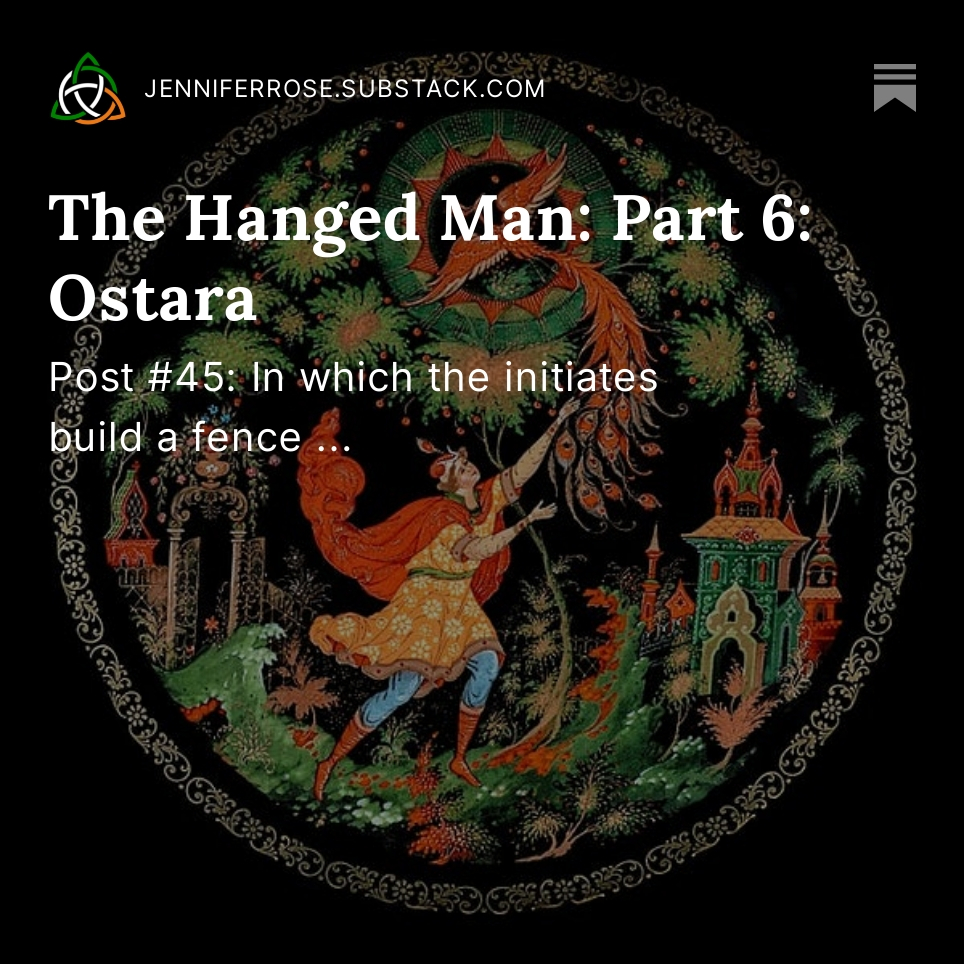
by Jenny Rose | Oct 15, 2022 | Emotional Intelligence, Fear, Feelings
One of my favorite filters through which to make choices is the question: Who benefits if I do this? Who benefits if I don’t do this?
It’s a deceptively simple question on the surface. Most of the choices we make in an hour, a day, are unconscious. We don’t take the time to think about them. We go with our instinct or impulse, we take the path of least resistance, we default to our familiar routine, we choose the most comfortable thing. Pausing to think our choices through slows us down and makes us uncomfortable.

Photo by Jonathan Simcoe on Unsplash
Unconsciousness is so much easier!
Last week I wrote about making choices, paths and no-paths, trying to navigate my life journey according to what works best for me, makes me happiest, and creates a life true to my particular values rather than doing what everyone else seems to be doing and following the most trampled trails. You know a lot of trash gets left beside the most heavily used roads, right?
I make many choices out of fear. I suspect we all do, but I won’t presume to speak for anyone but myself. In fact, I’ve posted about fear-driven choices before on this blog, years ago. Interesting, how we can spiral around and around in life, going a little deeper with each iteration.
Let’s take, for an example of a fearful choice, our own personal economic situation, whatever it is. If we are afraid to keep our accounts balanced, budget, open our bills, call a plumber, or commit to some kind of savings account, who benefits? Seriously. It’s a real question. Who benefits when we avoid dealing with our financial situation?
Any lender or business entity who charges interest or late fees benefits. Our bank benefits in overdraft or returned payment charges. Capitalism benefits if we don’t manage our spending habits and can’t resist advertising. Nameless, faceless institutions and corporations benefit from our fear. It’s in their best interests to complicate, obfuscate, create pitfalls and loopholes, offer “deals” and “sales.”
Who benefits when we put off dealing with a frightening physical sign or symptom, or facing an addiction? Both situations have the potential to get much worse, more frightening, more deadly, more expensive. So who benefits when we choose to deny, avoid, ignore what’s happening?
Who benefits when we sabotage ourselves, when we don’t choose to live according to the highest expression of who we are? Who benefits when we silence ourselves or allow others to silence us? Who benefits when we refuse risk, vulnerability, passionate creativity, joy?
I have never made a fear-based choice that didn’t eventually come back around and bite me in the ass. Most of us know the feeling of “what was I thinking?” Making the easiest or most seductive choice in the moment can mean years of cleaning up consequences and eventually having to revisit the original choice point and try again, hopefully with more wisdom.

Photo by Nicole Mason on Unsplash
And if we do circle back around, fear is still there. What if I get it wrong again? What if I fail? What if I can’t do this one thing I want to do more than anything else? What if the other kids laugh at me? What if I miss out on what everyone else is doing? What if this is my last chance?
“What if …” is nearly always the voice of fear, and it frequently stops me in my tracks. I can think of ten ways every choice might be the wrong one. All my demons throw a party and I’m stuck, locked in the bathroom without a friend or a way home while listening to them smash up the furniture..
Why do I make choices that benefit my fear? According to Oxford Online Dictionary, fear is a feeling arising from the belief that someone or something is dangerous, likely to cause pain, or a threat.
A feeling arising from a belief. Contrary to the increasing fanaticism and extremism infecting our culture, a belief is not necessarily true. We can and do change our beliefs.
Belief is a choice.
As for the feeling of fear, we are psychobiologically wired to feel it because it’s a survival mechanism. Our ancestors felt it and effectively responded to it; if they hadn’t, we wouldn’t be here.
Feeling fear is not the tricky part. What we choose to do with the feeling is. Do we use it as the good tool it is, or do we let it stop us, take away our power, keep us imprisoned?
More than that, do we feed it? Do we choose to benefit it?
If we allow our fear to take over our lives, as opposed to harnessing it to keep ourselves whole and healthy, who benefits?
No one and nothing but our fear.
Do we want to benefit a feeling based on a belief?
When I look at the world around me, that seems like a dark, well-trodden path with a lot of trash left beside it. I don’t see that particular path leading to any true connection, opportunity, or healing.
It’s not what I want. It’s not what I choose to do.
There’s enough fear in the world without me adding to it or enabling it, even in my small sphere.
Fear is for taking immediate, life-saving action. Or for weighing the pros and cons of a risky activity or choice. Or for directing our attention to a potential threat, a real threat, like the stranger peering in our window, not a belief.
We can benefit from our appropriate response to fear. Let’s not allow fear, or anyone manufacturing it, to benefit from us.
To read my fiction, serially published free every week, go here. 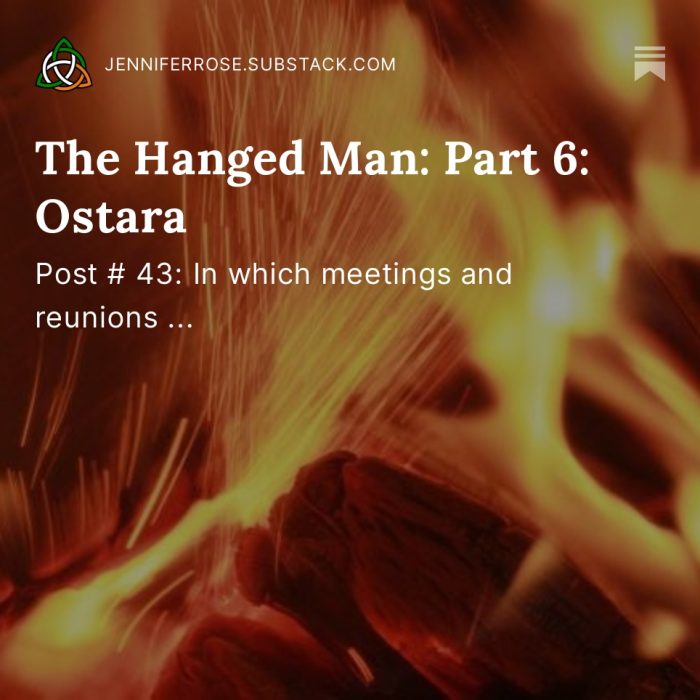
.
by Jenny Rose | Oct 8, 2022 | A Flourishing Woman, The Journey
Now is the path
of leaving the path.
And we hear our own voice
demanding of ourselves
a faith in no-path,
when there is no faith at all.
–David Whyte, from “Millennium”
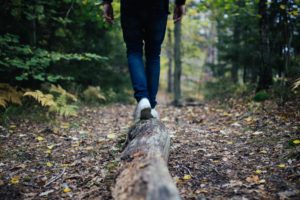
Photo by Jon Flobrant on Unsplash
I sit in my favorite grey-green overstuffed chaise, a pillow at my back, a cat curled in a cat bed behind me on the back of the chair, my laptop on my lap with a slim volume of poetry by David Whyte titled Fire in the Earth next to my leg. A bookmark indicates the above passage. It’s a chilly, grey day. As I sit here the furnace hums and stops, hums and stops, keeping the temperature around 60 degrees. This house we bought in May has a brand-new propane hot water furnace, supposedly the most economical and efficient available. This week is the first time we’ve used it. What will propane cost this winter? Will electrical costs spike as much as predicted? Will it be a cold winter or a mild one?
Always, this question in my mind: “Will I be able to manage economically?”
Enlarging my own personal bubble, I ran errands this morning. A haircut from a friend, during which we talked about the coming winter, how costly it might be, how cold it might be, how effective foam and cloth barriers like rags and old blankets might be in chinks and cracks around doors and windows. How can we hold in the heat, keep out the icy fingers of cold reaching for our paychecks?
I went to the town dump with the recycling, plastic and cans. Does all this material really go for recycling, or is it quietly disposed of in earth or ocean somewhere out of sight? I try to have faith that is really is recycled. Eggs are cheaper when I buy 18 in a carton, but the carton is plastic. But the plastic is recyclable. Maybe. If they actually do it.
This is the kind of thing that preoccupies my mind. A lot.
The furnace clicks on again. How much would I save if I turned it down just 2 degrees?
After the dump, I went to the store. I bought a couple extra jars of salsa, a couple extra pounds of butter. I’ve read about the climate-change decimated tomato crop this year and to expect shortages. Ditto butter. I bought a turkey on sale. It’s early, but I’ve read turkeys will also be in short supply. Every time I go to the store, I’ll buy a tomato product for my pantry, a pound of butter for the freezer.
Enlarging my small city bubble, maybe the projected shortages aren’t real. Maybe it’s all hype, designed to keep people spending as recession fears rise and prices climb. Maybe we can’t believe anything we read or hear from anyone. It’s like standing on the beach in bare feet, feeling the waves pull the sand away from beneath my soles, the sand of common sense, the sand of objective reality, the comforting, warm sand of sanity and critical thinking. Maybe the tide is too powerful, the waves too forceful for most people to withstand. Maybe, by the end, we will really believe in … nothing. Our individuality will be erased. Art, science, and thought will be exterminated. Our lovely sexuality will be neutralized and sterilized. Our magnificent bodies will be surgically altered according to our whims or the dictates of the totalitarians in charge and, if possible, amputated altogether from our increasingly narcissistic and developmentally arrested minds.
From the bubble of my chair in this moment of solitude with my fingers on the keyboard to the world. It’s a grim journey.
I feel increasing pressure to bring in more money. More hours are not possible right now at my job. Another job? Two other jobs? I’ve sold everything I can. I budget every penny. How much of my anxiety is based in real conditions and how much is my longstanding fear of scarcity and tendency to catastrophize? Is it not a job I need, but to GET A GRIP?
I can’t tell. Ask me when heating season is over.
Of course I could get a side job. It’s what a normal person would do. Need more money? Find more work. But is that the right thing for me to do? (I do still claim the right to think for myself.) Would the extra money be worth the time, the energy, the fatigue? I don’t want to live to work and earn. I’ve never wanted that. I’m nearly 59 years old. If I don’t take care of my excellent health, I may not get it back. Is an extra couple of hundred dollars a month worth the strain?

Photo by Angelina Litvin on Unsplash
I’d love to earn my living writing, but I believe it’s a less and less realistic dream. Traditional publishing is dying. Soaring costs and shortages, not the least of which is paper, are forcing change. Very few writers live by their writing alone. Very few. Many do earn some income from it, however.
I love books. I also love trees. If I must choose between a book in my hands and a tree, I’ll read on a digital device for the sake of the tree. Even now I never buy a new book, only used. I write – and people read what I write – on two digital platforms, this WordPress blog and Substack. Should I be monetizing those rather than searching for another job?
I’ve been having that internal conversation for years.
Would I rather avoid asking for donations or putting up a paywall and clean houses or something like that? Anyone can clean. No one but me can write what I write.
I recently picked up a couple of used books of David Whyte’s poetry. The first poem in the first book I opened contained the above excerpt. I was sitting outside in the weakening sun when I read it a couple of days ago. I put the book down and cried.
Oh, Mr. Robert Frost and his road not taken. The well-traveled roads. The less well-traveled roads. The once travelled but now overgrown roads. The paths we tread, following others, and directed by others. The faint game trails that peter out in the wilderness. The well-paved roads and paths that lead to Hell. And now Whyte asks if it’s time to leave the path altogether. Not only that, but to have faith when I have none. Faith in the no-path.
And aren’t we there, at the no-path? Civilizations have collapsed before, but not as the planet was undergoing its own collapse. Well, maybe that’s not right. Maybe in eons past it’s all happened before – relatively abrupt climate change, enormous die-off, cataclysmic geological and oceanic reshaping, and reemergence into a new normal, healthy, planetary system.
If there were paths humans could tread through all that, they’ve been lost.
But let’s make the bubble smaller again. I can’t choose your path, or anyone else’s. Is the right path for me the no-path? The money path is clear. Work more, spend less, have more money. We all know it. Most of us have walked it. It’s well-signed and well-traveled. There’s an equally well-signed and well-traveled path into theft, fraud, extortion, etc., but none of those are options for me, so let’s not complicate matters.
What’s the no-path? Oh, that would be the writing. Always. Whatever our creative work is, it takes us on to a no-path, because creativity is unique. We’re always breaking trail, one way or another. We may follow, for a time, the paths of others, or intersect their trails, but we’ll make our own unique track, worn by our footsteps as we go along, unrolling in front of our feet, existing only because we turned off the main road into a no-path … and made a path.
Faith in a no-path when there is no faith at all. What a strange, dream-like, impressionistic phrase, balancing on the edge of holy foolishness and divine wisdom. It would take a poet of Whyte’s caliber to – well, to take that path.
Right now I’m pausing, considering my options, thinking, feeling, reading and writing my way forward. I don’t have a map for these times. Does anyone? Perhaps faith isn’t necessary, just determination and choosing the next step.
Wherever we go
we can only take a step from here.
–David Whyte, from “Millennium”
It’s good to be reminded of the no-path. The six-lane highway we’ve been following has led to climate change, increasing political and social tensions, and worldwide social and economic instability. Who knows where a no-path might take me; it could hardly be much worse. At least it would be my own path, chosen by me. My feet would define it, my choices shape it. My sweat. My challenges. My journey. No guarantees, but no lies, either. Lonely, perhaps, but I’m no fan of doing what everyone else does, just for the sake of it.

Photo by NASA on Unsplash
Or maybe it’s not a question of travel at all, at least not all the time. Maybe it’s a question of standing still, like a mountain, like a tree. Standing still is an art we’re losing as a species. Maybe there’s nowhere to go and nothing to do; everything is just as it should be, no matter how uncomfortable or fearful. Maybe I have enough.
Maybe I am enough.
And standing still,
saying I, and the small vision I have
-is enough, becomes the hardest path of all.
–David Whyte, from “Millennium”
To read my fiction, serially published free every week, go here:
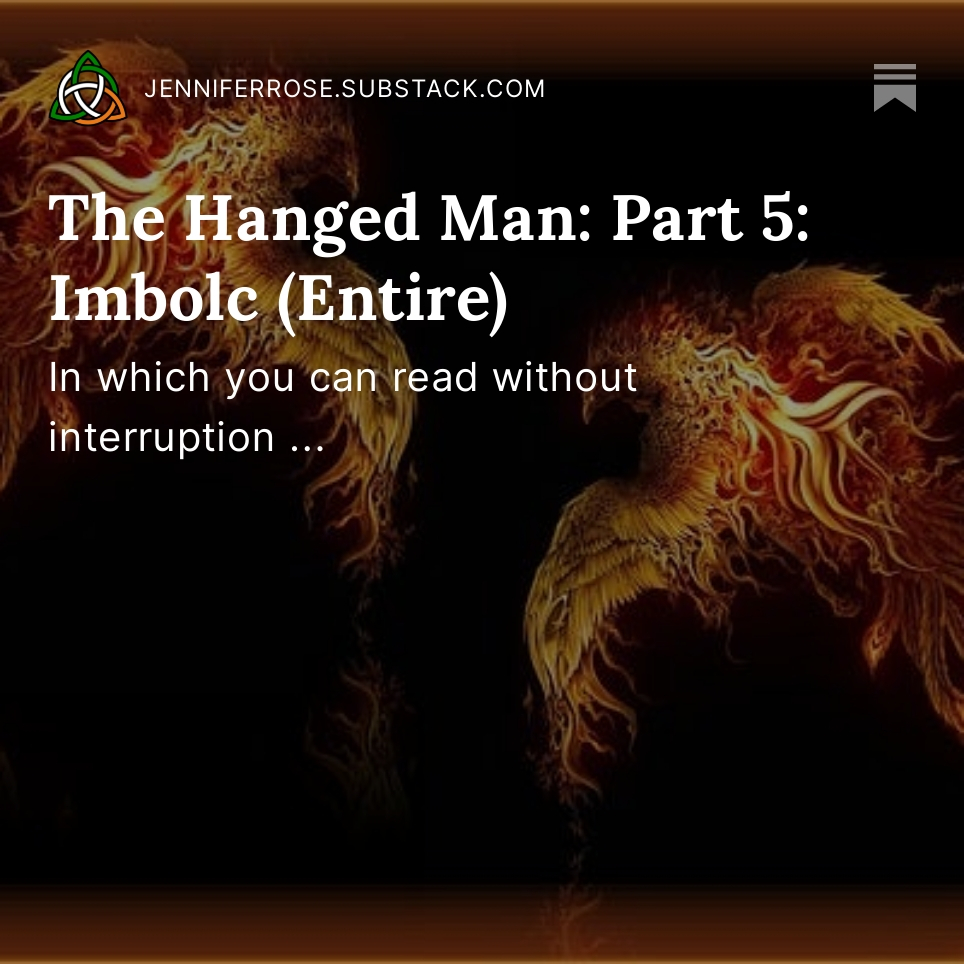
by Jenny Rose | Sep 11, 2022 | Choice, Power
Probably every child is told we all have to do things we don’t want to do.

Photo by Cristina Gottardi on Unsplash
Children are concrete, and I was no exception. When I heard we all have to do things we don’t want to do, I thought it meant that’s what life was supposed to be about, a kind of slavery to all those things we don’t want to do. No one talked to me about balance, or doing the things we do want to do.
It made life seem like an unhappy business, years and years of unending duty, responsibility, and doing what I didn’t want to do. No recess. Or maybe what I really wanted to do was bad and wrong? Maybe I should want to do what I didn’t want to do. I wasn’t sure. A part of me went underground. I didn’t want anyone to know how bad I was, how flawed. I worked hard at the things I didn’t want to do and hid the things I did want to do, in case they were wrong.
But I couldn’t conceal the feeling of wanting and not wanting from myself. I used to make hidey holes in whatever house we were living in at the time and go to ground with a book, but I always felt guilty. I wanted to read. Doing what I wanted to do was bad. I should have been helping my mom do all the things she didn’t want to do.
The pronouncement that we all have to do things we don’t want to do is stated as a Cosmic Truth, especially as an adult tells it to a child. It’s loaded with feelings and experience a child can’t possibly understand, but the subtext was clear to me:
Life is not much fun.
I can’t resist picking apart Cosmic Truths as an adult, and as I think about this one it occurs to me it really has to do with personal power more than wanting or not wanting. It’s not framed in terms of personal power because our emotional intelligence is so low. Making choices based on whether we want to do something or not is childish. Power resides in the act of choice, not in the wanting or not wanting.
Steering our lives solely by our desires is hedonism, a belief that satisfaction of desires is the purpose of life. Desire, though, is so shallow, so fleeting. And it’s never permanently satisfied. No matter how well and pleasurably we’ve eaten, we’ll be hungry again. Desire is a treadmill we can never get off.
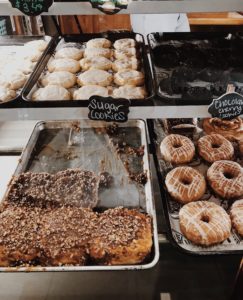
This is not to say we shouldn’t ever choose something we want or say no to something we don’t want, but our desire is easily manipulated. That’s why advertising works. If we can be easily manipulated, we’re not standing in our power. Addiction is based, at least in the beginning, on wanting and not wanting.
A more useful question than What do I want to do? is What would be the most powerful thing to do? We might want to eat a carton of ice cream, but a walk feeds our health, well-being, and thus personal power much better. After all, one carton of ice cream leads nowhere but to another. Personal power can lead us to joy and experience a carton of ice cream never dreamed of.
- If we don’t choose to do difficult, frightening, or new things, we’ll never grow.
- If we don’t choose to take care of our bodies, they won’t function well.
- If we don’t choose to be self-sufficient and resilient, we’ll be dependent.
- If we don’t choose to learn anything, we’ll remain ignorant.
- If we don’t choose to plan ahead, prepare, or manage consequences, we diminish our choices, waste resource, and weaken the contribution we’re capable of making.
- If we don’t choose the responsibility of commitment and making choices, someone else will make our choices for us.
And so on.
I’m changing the frame. I’m less interested in what I want and what I don’t want and more interested in how my choices affect my power, and the power of those around me. I’m willing to do what I don’t want to do if it’s a step on a road leading to integrity, power, healthy relationship, or anything else important to me. At the same time, I can exercise my right to say no to things that won’t take me where I want to go.
It’s about power, not desire. Any three-year-old can want and not want. It takes an adult to manage a healthy balance of personal power.
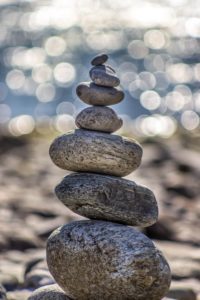
Photo by Deniz Altindas on Unsplash
by Jenny Rose | Aug 20, 2022 | Connection & Community, Emotional Intelligence
Trust: Firm belief in the reliability, truth, ability or strength of someone or something (Oxford Online Dictionary)
Mistrust: General sense of unease towards someone or something
Distrust: Specific lack of trust based on experience or reliable information
Leo Babauta recently published a piece on practicing trust which has given me much food for thought.
Trust is an uncomfortable subject for me. For most of my life I’ve considered myself to be shamefully distrustful. As I’ve learned emotional intelligence, I’ve realized I have plenty of good reasons for my mistrust and distrust, but there’s still a part of me that feels I should be more trusting, more willing to give others a second, or third, or hundredth chance, less guarded, more open, more forgiving.

Photo by Liane Metzler on Unsplash
Except I know intellectually forgiveness does not mean an automatic reinstatement of trust.
In my heart, I feel like a bad person, especially a bad woman, because throughout my life people who say they love me have appeared to be hurt by my lack of trust. Yet those same people have given me reasons not to trust them.
When I wind up in these confusing emotional cul-de-sacs, I blame myself. I’m being too dramatic (again). I’m being a bitch. I’m mean. I can’t love, or let anyone love me. (Does trust = love? Does all love automatically come with trust?) When I explain the specific events leading to my mis- or distrust, I’ve frequently been told the other party doesn’t remember saying what they said or doing what they did. This implies I’m nitpicking, ridiculously sensitive, keeping score, or even making it up. I wonder if I’m being gaslighted, or if I’m just not a nice person.
Years and years ago I made a rule for myself: give every situation or person three chances before deciding not to trust. It still feels fair to me. Sometimes things happen. We have a bad day. We say hurtful things, or don’t keep our word, or make a boneheaded choice, breaking trust with someone. I know I’ve done it, and I’d like to be given the benefit of a doubt.
The benefit of a doubt is fair, right?
I still follow that rule. It feels appropriately kind to others and like good self-care. Yet I feel guilt nearly every day over the people in my life who I want to trust, feel that I should trust, and don’t trust.
Babauta’s article specifically addresses signs of distrust of ourselves, and some ideas about practicing self-trust. I never connected problems with focus, fear or uncertainty, procrastination or indecision with lack of self-trust, but I can see they might be. If we don’t trust our priorities, resilience, or choices, it’s difficult to be decisive or take risks with commitments and problem solving.
If we don’t trust ourselves to cope effectively with sudden changes and reversals and frightening situations, uncertainty and chaos disable us, making us vulnerable to anyone or anything promising relief, certainty, or help.
The boundary between trust in ourselves and trust in others is permeable. If we define ourselves, as I do, as “having trust issues,” presumably that includes issues with ourselves as well as others.
It makes me shudder to imagine living with no feeling of belief in the reliability, truth, ability or strength of anyone or anything. How could anyone sustain such an emotionally isolated condition, not only from those around them but from themselves?
I do have people in my life I trust. Is it possible I don’t have trust issues? Is that just a polite, apologetic, and roundabout way of avoiding a direct “I don’t trust you?”
Do I have to answer that?
It’s true I trust far fewer people than I distrust.
But it’s also true I give people and situations a chance. Three chances, in fact. At least.
Why does it seem so cruel to tell someone we don’t trust them?
Trust, as I experience it, is not all or nothing. I might trust a person to be kind and caring but never allow them to drive me anywhere. I might trust a person with money but never trust them to be on time. I trust myself to be there for others, but I haven’t trusted myself to be there for me.
Consumerism is about distrust. We’re actively groomed to distrust ourselves. Yesterday I was laughing with a friend about articles on MSN. There was an article about trends and fashion in decorating, as though it matters. Shiplap is out. White kitchens are out. Accent walls are out. Then there was an article about how to properly fold plastic grocery bags. I’m not kidding. Did you know you’ve been storing plastic grocery bags the WRONG WAY all these years? How could you be so incompetent? A capitalist culture only survives as long as people buy things, and advertising (and a lot of other media) is about the ways you need to improve, do it right, be better.
Advertising is manufactured distrust. We’re inadequate, but a widget would make us better. We buy, and we discover we still don’t feel good enough, and another ad tells us we need a nidget. So we buy that, but then we see a gidget on sale that will make us even better …
Who benefits most from our lack of trust in ourselves?
I believe information is power. I believe education is power. I believe in science, data, and critical thinking. I trust those things.
Who benefits most from the breakdown of public education, the demonization and gutting of scientific organizations and communities, manufactured misinformation, manufactured disinformation, and “alternative facts?”

Photo by roya ann miller on Unsplash
The Center For Nonviolent Communication says trust is a human need; it’s listed under connection needs. When our needs aren’t met, our health (mental, physical, emotional) suffers. If we are unable to trust we’re wide open to conspiracy theorists, ideologues, authoritarians, and other abusers and manipulators. Predators happily gorge off the results of manufactured distrust.
This is a big, big, problem, because it stands between us and managing things like climate change. Which, depending on who you talk to, isn’t even real because science has been the target of so much manufactured distrust.
One day, sooner rather than later in the Southwest, a switch won’t deliver electricity and a faucet won’t deliver water. Scientists have been talking about consequences of climate change and drought in the area for decades. It was one of the reasons I left my lifelong home in Colorado and came to Maine nearly eight years ago. A combination of manufactured distrust, denial, and the misplaced priority of winning the next election have effectively stopped any kind of collaborative or cooperative problem-solving around water usage throughout the Colorado River watershed, and here we are, on the brink of multi-state disaster that will affect the whole country.
Trust is a choice we make many times a day. Do we trust our families, coworkers, and friends? Do we trust the headlines we read, the news anchor we hear, or the algorithms providing us with “information” on social media? Do we trust what lands in our Inbox or the unfamiliar number calling us? Do we trust the oncoming car will really stop so we can safely walk across the busy street?
More importantly, do we trust our own instincts, feelings, and capability? Do we actively teach our children to trust theirs? Do we encourage our friends and loved ones to trust themselves? Or do we tell people they have it wrong, it didn’t happen, they’re being ridiculous, they don’t understand?
Choice comes with consequences and responsibility. Choice is dynamic; do we trust if we make a choice that doesn’t work out the way we hoped, we’ll choose again? Do we trust ourselves to be wrong and learn something before we choose again? Do we trust our ability to problem solve, bounce back, and do the best we can most of the time?
I suppose somewhere between having no trust at all and trusting everyone and everything lies a fine line of willingness to trust. We could approach new situations and people with curiosity and an open mind, be big enough to give the benefit of the doubt, and have healthy enough boundaries and the self-trust to disengage when we have evidence and experience indicating our trust is misplaced.
The first step in rejecting manufactured distrust is building trust in ourselves and demonstrating our own reliability, truth, ability and strength as we engage with others.

Photo by Ryan Moreno on Unsplash















